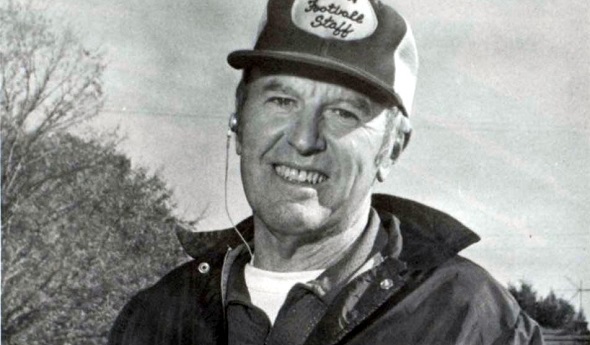
Early Wins Leader Maskill Built Champions
November 12, 2019
By Ron Pesch
Special for Second Half
The long shadows of “midcentury modern” coaching legends have mostly disappeared from the gridirons of Michigan.
One more vanished in late October at the age of 96.
Bill Maskill was once the winningest football coach in Michigan high school history, chalking up the majority of his victories at Galesburg-Augusta. One of only six who could claim such an honor – coaches are first counted after reaching 200 wins – he received his start in coaching at Sheridan High School (now known as Central Montcalm since the Sheridan and Stanton school districts merged in 1963). In 1980, he became only the second coach to compile 200 varsity victories as a coach, and in the fall of 1982 he surpassed Muskegon Heights’ coaching legend Oscar E. ‘Okie’ Johnson on the victory list.
Maskill’s coaching accomplishments – and their historic significance – are a reminder of a change in eras. Michigan prep sports in the pre-playoff days were filled with coaches with Swiss-Army like skills, as many were expected to coach multiple sports at their respective schools. The gridiron season was unlike today’s in many ways, and the differences are reflected in a variety of manners within the state record books.
Coaching and player season performances up to the creation of the MHSAA Playoffs in 1975 were constrained by the schedule. In general, nine games was the max. (With the playoffs, a season can extend up to 14 games.) Maskill’s victory total now ranks 16th overall in Michigan high school history, as there are 63 coaches with at least 200 varsity wins. Two coaches, John Herrington of Farmington Hills Harrison – the state’s current leader – and Al Fracassa, long of Bloomfield Hills Brother Rice, amassed more than 400 varsity victories during their careers. In both cases, more than 65 victories were earned during the postseason.
The MHSAA postseason was approaching its eighth year of existence when Maskill passed Johnson as the winningest football coach in state history. To that point, Maskill’s Rams had twice qualified for the playoffs – the first time in 1976, and again in 1980 – but had yet to win a game during the postseason.
But he stayed atop the state’s football wins list for more than a decade – and later found playoff successes as well, more crowning achievements for a coach whose many wins came after turning around both programs fortunate enough to employ him over a combined 44 seasons.
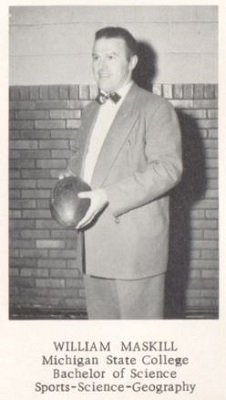
A Rough Start
Maskill’s career, at least in his eyes, was nearly derailed during his first season at the helm.
“The year was 1949, and Bill Maskill was in his first year as varsity football coach at Sheridan High, about 50 miles north of Lansing. He thought it would probably be his last. His team did not win a single game. ‘A couple of times, I thought of throwing in the towel,’” Maskill told Mick McCabe of the Detroit Free Press in October 1982, when he surpassed Johnson in victories.
There was little likelihood that Maskill would be dismissed as coach after that disappointing season. But it took a few years for his Redskins to become competitive.
“Previous to his work there, Sheridan had not played football and there was little interest in the game,” noted the Battle Creek Enquirer in the spring of 1957, when Maskill was announced as the new football and baseball coach at Galesburg-Augusta High School. “He built up interest to the point that during the past five years, Sheridan has won the Montcalm County League championship once and finished second for four years. During this period, the team’s overall record was 31 won, 9 lost and 2 tied. In baseball, he had one county championship, finished second twice and third twice.”
A 1941 graduate of Detroit DeLaSalle, Maskill had been a hard-plunging fullback on the football team who also boxed in Catholic Youth Organization tournaments. Following graduation, he initially enrolled at the University of Michigan in 1942, receiving his freshman numerals from coach Wally Weber, but only after a year at prep school near Pittsburgh.
“I screwed around a lot in high school and couldn’t get into Michigan,” he told McCabe years later, laughing. “They sent me to this prep school, and I couldn’t believe all the studying I had to do. It was the best thing to ever happen to me.”
He ended up at Michigan State, where he earned a varsity letter from coach Charlie Bachman in 1944 and his bachelor’s degree.
“He was hard of hearing; he had it bad,” recalled Bob Ludwig of Muskegon, a football teammate with Maskill in the backfield for the Spartans in 1945. “Our quarterback would mouth the words of the play to him.”
Over time, Maskill had multiple operations in hopes of correcting the issue.
The attempts improved his hearing, according to Maskill, “to about six percent. And that’s the truth. But there are some advantages. The kids can cuss at me and I don’t know it.”
The disability never stopped him. He told McCabe that the only thing he ever wanted to be in life was a football coach: “I just liked playing football, and that made me want to coach.”
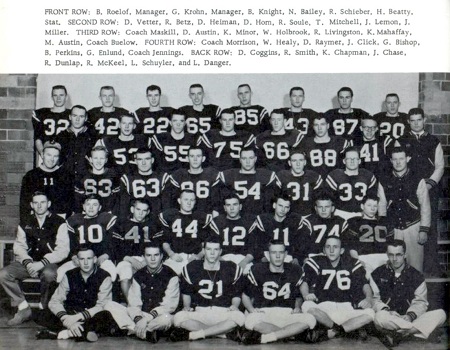
Another Rough Start
At Galesburg-Augusta, he inherited a team that finished with a single tie amid eight losses the year prior to his arrival. Improvement certainly wasn’t reflected in the standings in Maskill’s first year in charge. The Rams completed the eight-game season without a victory or a tie to show for their efforts. That changed in year two, as G-A finished with a 7-1 mark. The only loss was to unbeaten Bangor, 40-21, in the season finale. In 1959, Maskill and his stable of assistants had completely flipped the table, as the Rams ended with a perfect 8-0 mark.
“Galesburg-Augusta blasted Bangor, 27-0, before a crowd of more than 2,500 fans at jam-packed Angell Field in Kalamazoo … in a battle between the Kalamazoo Valley’s unbeaten football teams. Bangor’s great 21-game winning streak simply collapsed before the high-powered running attack as the Rams rolled to their seventh straight victory of the season,” wrote Dick Kishpaugh in his coverage for the Enquirer. Kishpaugh would later be known as Michigan’s authority on high school sports.
A week later, the Rams trounced a solid Paw Paw team on the road, 33-7. They finished third in the United Press International season-ending Class C-D rankings behind Charlevoix and Cassopolis.
Statewide Success
That was the first of eight G-A squads to finish the regular season undefeated for Maskill. The next four would each be named mythical state champions according to the polls.
His 1962 team allowed only 14 points across eight games to end the year as Class C-D champion ahead of St. Joseph Catholic according to The Associated Press poll of Michigan sportswriters and sportscasters.
Maskill’s 1966 and 1967 Rams squads each finished unbeaten and untied in nine contests. The 1967 team scored a school-record 389 points on the year, and held opponents to a mere seven points – a touchdown and an extra point scored by Springfield in a midseason 27-7 triumph. The 1970 team also finished with a flawless 9-0 mark, topping the 1967 team’s offensive output with 408 points on the season.
Maskill’s 1976 team ended the regular season 9-0 and was one of only four teams to advance to the Class C postseason in place during those earliest days of the MHSAA playoff system. G-A immediately was eliminated by Flat Rock, the eventual champion.
The media spotlight came to Galesburg-Augusta in 1980 for a regular season-ending contest with Constantine. A victory would give the veteran coach another perfect regular season and push Maskill’s career win total to 200. The week played out under television station coverage and multiple newspaper reports.
“More than 120 of Maskill’s former players were on hand, some wearing varsity letter jackets that were nearly 20 years old. All trotted onto the field, according to their graduation years, during halftime festivities,” said Bob Byington in the Enquirer. “… The warmest embrace and greeting were reserved for Maskill’s son, Bill Jr., an assistant coach at the University of Louisville. The younger Maskill drove in from Kentucky to surprise his dad …”
 The Rams won 28-6 to finish 9-0, qualifying for the MHSAA Playoffs for the second time in school history. The team ranked fifth in the final AP poll. A loss to White Pigeon in the opening round capped the season.
The Rams won 28-6 to finish 9-0, qualifying for the MHSAA Playoffs for the second time in school history. The team ranked fifth in the final AP poll. A loss to White Pigeon in the opening round capped the season.
Despite impressive 8-1 records in 1981, 1982 and 1983, the Rams didn’t return to the playoffs until 1985. There, they won their first postseason contest, downing Hudson, 21-6, in a Pre-Regional. G-A fell the next weekend to eventual Class C titlist Lansing Catholic Central.
Lansing Catholic would again eliminate the Rams from the postseason the following year.
We Have a Lot of Heart
The MHSAA approved an expansion to the football playoff system in 1990, doubling the classifications from four to eight, which in turn doubled the number of annual qualifiers. While the Rams finished the regular season with a single defeat, they were unranked in the weekly press polls. Thanks to the changes to the playoff system, they were in the tournament, but weren’t expected to go far.
Rumors had circulated that this – Maskill’s 40th year as a head coach – would be the last go-around for the 67-year-old veteran coach. The first-round opponent was No. 4-ranked Dansville. With the Rams trailing 17-0 with 8:33 remaining in the third quarter, the result didn’t look promising.
But Jason Meek would have none of that. The Rams started their comeback with a trick play – a halfback pass by Meek off a lateral for a touchdown reception by Rusty Smith. It was followed on the next possession by a 27-yard TD reception by Meek from reserve quarterback Dave Lemmien. A pair of 2-point conversions by Rick Tyson had cut the lead to 17-16. Tyson scored the game winner on a one-yard touchdown run, set up by an interception by Meek that capped a 14-play, 59-yard drive – all rushes – that burned 6:53 off the clock. The defense shut down Dansville for the remaining six minutes of the contest.
A week later, the Rams lined up against No. 1 Schoolcraft, the two-time reigning Class C champion which was riding a 16-game win streak. The Eagles had lost only three of their last 57 games.
Galesburg-Augusta stunned all prognosticators with a 15-13 win before nearly 5,000 fans.
The Rams ran the ball 52 times, with Tyson handling the ball 28 occasions for 78 yards including a 19-yard TD that opened the game’s scoring. Schoolcraft tied the game at 7-7 just before the half, then opened a 13-7 lead on its second drive of the second half.
“It took all of us to do it,” said G-A junior fullback Paul Zimmerman, who scored the game-tying touchdown, and winning 2-point conversion on nearly identical plays with 4:01 remaining in the game.
Again, like the previous week, the Rams’ defense rose to the occasion, shutting down the Eagles for the remaining minutes.
“They kept the football,” said Larry Ledlow, coach of Schoolcraft about the second half. “Our defense was on the field much too long.”
G-A would win its Week 12 Semifinal contest with Clinton, 22-7, to advance to its first MHSAA Final. Corky Meinecke wrote a career-respective feature on Maskill that appeared in the Free Press on the day of the game:
“Just about everyone who loves, respects and admires Bill Maskill … figures he’ll announce his retirement sometime after the Rams play Muskegon Catholic Central … in the Class C championship game at the Silverdome. The timing couldn’t be better. Getting the Rams (11-1) to the Silverdome was the last notch on a heavyweight coaching belt that includes four mythical state titles … and five playoff appearances. He is the winningest football coach in state prep history …”
Weighing into the pending decision was a surprising aspect few ever considered.
“Maskill never figured he’d run out of players before he ran out of desire,” wrote Meinecke, “but that appears to be the case. Of G-A’s 24 players, only six are underclassmen. The school did not field a freshman team and the junior varsity – comprised of mostly freshmen – forfeited its last two games because it could not suit up enough players.”
 “A normal person would retire,” said Ken Buelow, Maskill’s assistant for all but three of the coach’s seasons at G-A and Sheridan. “But you have to remember, Bill is not a normal person. You’re talking about one hell of a human being here.”
“A normal person would retire,” said Ken Buelow, Maskill’s assistant for all but three of the coach’s seasons at G-A and Sheridan. “But you have to remember, Bill is not a normal person. You’re talking about one hell of a human being here.”
“We don’t have size, we don’t have quickness and we don’t have speed,” Maskill said to Meinecke about this team that was perhaps the most satisfying of his career. “But we have a lot of heart.”
The Rams lost to MCC.
Changing landscapes
Maskill’s decision still took time. In August 1991, the G-A administration officially announced that the district would not field a varsity football team that coming fall.
“We do not have the numbers,” said athletic director Alex Forrester at the time. “It has nothing to do with money. … We do not have enough players.”
G-A chose to sponsor only a JV team that season. Instead of walking away, Maskill chose to stay on.
“I’ve never not coached a varsity,” he told Mark Bradley of the Enquirer. “I won’t know how to coach at the junior varsity level. But coaching is coaching, whether it be at the varsity or junior varsity level.”
He had retired from teaching following the 1980-81 school year and was one of 30 individuals inducted into the inaugural class of the Michigan High School Football Coaches Association’s Hall of Fame in April 1983. In October 1986, the school district honored him by naming the G-A football field in his honor. Without Maskill walking the halls and recruiting, fewer and fewer kids came out for football. After a year leading the JV, in July of 1992, he officially stepped aside from coaching. Forrester, one of his longtime assistants, took charge.
Maskill had purchased a tire company after he retired from teaching, and that became his focus.
In October 1994, over 12 years after Maskill had passed Johnson on the win list, Marysville’s Walt Braun passed Maskill in total wins. Leo “Smokey” Boyd of Saginaw Nouvel overtook Braun on the list in 1996. In turn, Fracassa topped Boyd in 2001, and Herrington bettered Fracassa’s total in 2017.
The “Ram Family”
The floor-to-ceiling mementos from his career that Maskill shared with Meinecke during their conversation were a feature of a party that Maskill would host annually.
“… It was not unusual to have 200-plus (former players, coaches, and new and old friends) there to celebrate the man they knew as ‘Coach’,” wrote Bill Broderick in a heartfelt article in the Enquirer, announcing Maskill’s passing.
Several years back, Buelow, his old assistant coach, had organized a group to create “a would-be Galesburg-Augusta football museum” in Maskill’s basement.
“… I was shocked when I heard,” said Bill Maskill, Jr., to Broderick concerning his Dad’s passing. Head football coach at Midwestern State University in Wichita Falls, Texas, since 2002, Bill Jr. had earned all-state honors at quarterback as a senior at G-A in 1966. "He went out and walked a mile on Monday. We all thought he would live forever."
 Ron Pesch has taken an active role in researching the history of MHSAA events since 1985 and began writing for MHSAA Finals programs in 1986, adding additional features and "flashbacks" in 1992. He inherited the title of MHSAA historian from the late Dick Kishpaugh following the 1993-94 school year, and resides in Muskegon. Contact him at [email protected] with ideas for historical articles.
Ron Pesch has taken an active role in researching the history of MHSAA events since 1985 and began writing for MHSAA Finals programs in 1986, adding additional features and "flashbacks" in 1992. He inherited the title of MHSAA historian from the late Dick Kishpaugh following the 1993-94 school year, and resides in Muskegon. Contact him at [email protected] with ideas for historical articles.
PHOTOS: (Top) Bill Maskill Sr., here during the 1980-81 school year, was the state’s winningest high school football coach all-time after his final varsity season in 1991. (2) Maskill, shown here during the 1954-55 school year, played football and earned his bachelor’s degree from Michigan State. (3) The 1959 Galesburg-Augusta team finished 8-0. (4) The 1966 Galesburg-Augusta team was named a mythical state champion by media rankings. (5) Maskill took his team to the MHSAA Finals for the first time in 1990, when it finished Class C runner-up. (Photos gathered by Ron Pesch.)
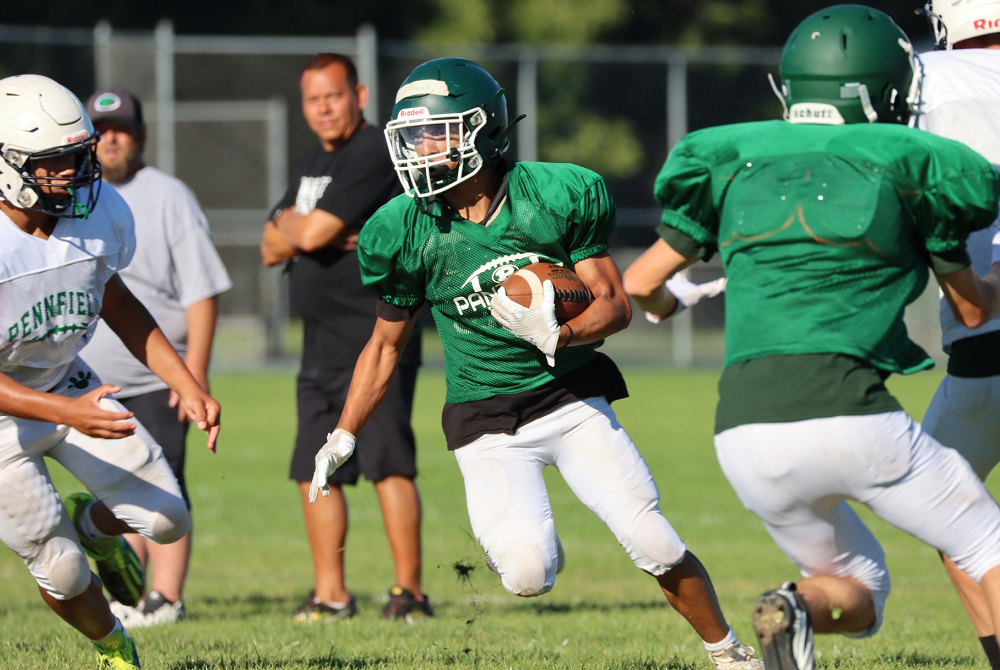
Pennfield Football 'Family' Ready for Kickoff with New Coach, New Home
By
Pam Shebest
Special for MHSAA.com
August 22, 2023
BATTLE CREEK – New coach, new stadium, new attitude.
 The Pennfield football players cannot wait to start restoring Panther Pride.
The Pennfield football players cannot wait to start restoring Panther Pride.
After suffering through an 0-9 season last year, “All the varsity players who have been here through the bad were skeptical – including myself – of new coaches, new everything, basically,” senior outside linebacker/wide receiver Thomas Kurtz said.
“But once we got familiar with the coaches and got to know them more, it felt like they were always here. It felt like their impact was so profound that it felt right. Me, personally, I’m loving every second of it.”
Architect of the new-look Panthers is head coach Robbie Hattan, who is also loving every second of his new position.
If enthusiasm can inspire players, Hattan’s the guy.
He led Colon to the MHSAA 8-player Division 1 title in 2019 and was named Coach of the Year for the division by the Michigan High School Football Coaches Association. Over his seven years at Colon, Hattan’s Magi also were 2021 Division 2 runners-up and made Regional Finals or Semifinals three more seasons.
He hopes that success translates to Pennfield, which has hovered around .500 most of the last decade after several previous impressive finishes.
A key, Hattan said, is leading with love.
“I’ve always led with love,” he said. “It’s gotten hard to get these kids used to another man telling them, ‘Hey, I love you.’
“We define family in our program as ‘Forget about me, I love you.’ Love is sacrifice. If we can get our kids to be able to sacrifice themselves for the team, for the family, we’ll be very successful.”
Players were a bit skeptical at first, said Hattan, who started work as the district’s facilities and maintenance director Jan. 27.
“I went the first two weeks before (players) would talk to me,” he said. “They kind of gave me the cold shoulder. Then they got to know me a little bit.”
Kurtz said he was “a little scared because this is the new head coach. The more I got to know him, the more approachable he seemed and the more friendly he seemed.”
Interactions with players were important to Hattan when choosing his assistants.
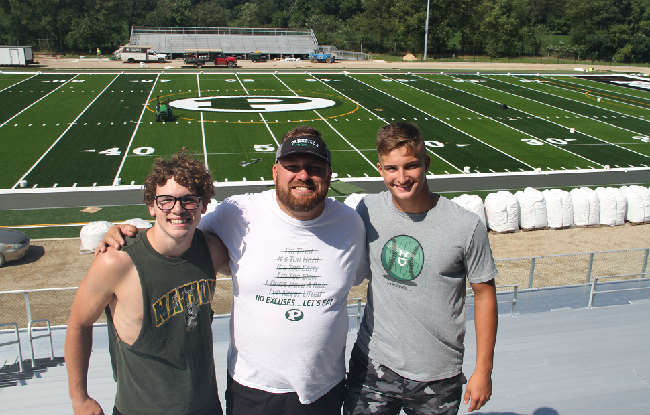 “I need to know, do you love kids, do you love athletes and building a positive culture,” he said. “You can be the best Xs and Os guys, but if you’re not great for kids, I don’t want you.”
“I need to know, do you love kids, do you love athletes and building a positive culture,” he said. “You can be the best Xs and Os guys, but if you’re not great for kids, I don’t want you.”
Two assistants are Pennfield legends Chris Lok and Jason Livengood, both members of the last Panthers football team to win a state championship. That was in 1991.
“Pennfield has a rich tradition of being successful,” Hattan said. “From 1973 to 2013, they didn’t have losing seasons.
“The history is here; the fans want to support. It’s getting the kids to feel like somebody loves them.”
Talking about Lok and Livengood, “They bleed Pennfield,” said Hattan, who also kept Matt Merlington and Chris Minor from last year’s staff.
The coach has one other legend connection on the team.
Senior Daniel Wells is the grandson of “legendary Pennfield coach Dave Hudson, who coached all those winning seasons,” Hattan said.
Wells said his grandfather is “excited to see that someone with a lot of knowledge is coming in and really trying to educate us on the game of football like if we haven’t seen it before.”
Hattan named Jason Porter, who coached at Kalamazoo College and Kalamazoo Loy Norrix, as his defensive coordinator. Hattan also brought two assistants with him from Colon: Joe Sweeter and Zach Doerr.
“Any school I’ve been at, I’ve asked (Sweeter) to come with me,” Hattan said. “He was with me at Litchfield, he was with me when I coached semi-pro football (Battle Creek Coyotes), he helped me at Gull Lake for a year, he was with me at Colon.”
Doerr lives in Battle Creek, and when the commute to Colon became a bit much, he stepped away. Now he is back with a much shorter drive.
Talking about that makes Hattan laugh since he currently lives in Colon and makes the drive to Battle Creek each day.
“My kids still go to school (at Colon) while we look for houses in Battle Creek,” Hattan said.
“We want to be in this community, because for me building a family and a culture that kids want to be a part of requires around-the-clock availability as a football coach.”
And experience abounds among the leadership.
“I look at my offensive staff and we have guys who have 25, 30 years coaching experience,” Hattan said. “When you add all of the years our staff has coaching, I don’t think there’s a staff in the state that has as much credentials as this staff has.”
Community & Communication
The first year Hattan was at Colon, the team played 11-player football. The Magi then switched to 8-player for the last six.
Going back to 11-player is much easier, Hattan said.
“The biggest difference is the speed,” he said. “In 8-man, if you are fast, you can be good, where 11-man, there are more guys. Yes, it’s good to be fast, but you also have to have some size to make some holes.
“Eight-man’s tough because you’re always like, ‘I wish I had one more player. If I have one more player, I could fill that hole better or I could do this.’”
One highlight this season is a brand-new football stadium and Hattan said he was amazed watching every step of the artificial turf installation.
“It was an incredible process,” he said. “Once the different shades of green were rolled out, all the white was cut in. The numbers, the lines, the hash marks, the logo, the letters were cut in and sewn in by this crew.
“There’s also new bleachers, track, lights, concessions. It’s going to be a wonderful complex for our community.”
Hattan added that everything but the field itself was a small part of a $30-million bond passed in 2020. The turf will be paid for through fundraising efforts.
Hattan noted the field also has lines for lacrosse and soccer sewn in, and an eight-lane track will be installed.
“Our band is going to be able to be out here. We’re putting in a video board, so maybe we can do some movie nights out here. There are a lot of different things we can do for our community.”
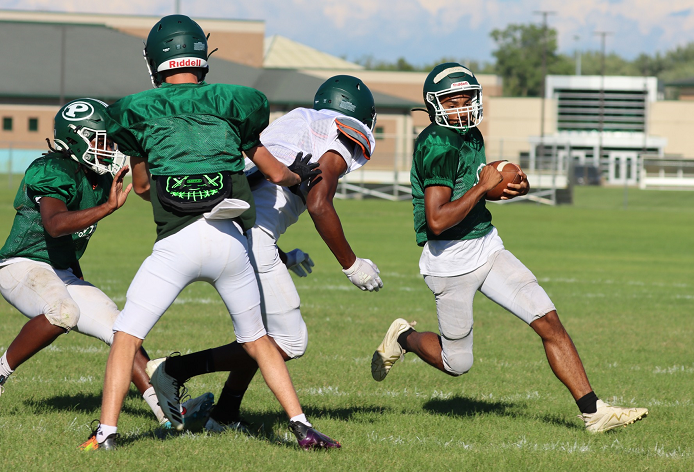 The football team is also a community, Wells said.
The football team is also a community, Wells said.
The biggest difference this year is “community and communication,” the senior linebacker/guard said. “A lot more conversation with coaches.
“This year I’ve already talked to Coach more than I talked to my last coach in three years. The communication is on a whole new level.”
As for learning a new system, “It’s pretty tough having to relearn everything including the basics, but it’s not hard as long as you are willing to constantly learn more and better yourself as a team,” Wells added.
Communication and love were on display early.
When an upperclassman wanted to join the team late, Hattan allowed the players to decide.
When some of the players balked, Kurtz spoke up.
“I believe that everybody deserves a chance to do something they love,” he said. “I wouldn’t want to deny somebody the chance of making memories and maybe even creating new bonds with people they never would have imagined they would.”
The player is on the team and fitting in well.
“That really moved me,” Hattan said. “That’s how you build culture. As you get kids to understand that, at the end of the day, if you can say, ‘Forget about me, I love you.’"
Players had their first taste of competition during a non-scored scrimmage at Sturgis.
“I think we competed very well,” Hattan said. “Our kids were flying around the field and very enthusiastic about football. Our defense was a very strong point of our team.
“Kids were rallying to the football and trusting their teammates to do their job. Offensively, we looked like we were new to the system we are just putting in. We had some hiccups but had a lot of positive things.”
Pennfield begins the season Thursday at Lake Odessa Lakewood. Home opener is Sept. 8 against Parma Western.
“We might be tightening down a couple screws (at the new stadium) Sept. 7,” Hattan said. “But we’ll be ready to play.”
 Pam Shebest served as a sportswriter at the Kalamazoo Gazette from 1985-2009 after 11 years part-time with the Gazette while teaching French and English at White Pigeon High School. She can be reached at [email protected] with story ideas for Calhoun, Kalamazoo and Van Buren counties.
Pam Shebest served as a sportswriter at the Kalamazoo Gazette from 1985-2009 after 11 years part-time with the Gazette while teaching French and English at White Pigeon High School. She can be reached at [email protected] with story ideas for Calhoun, Kalamazoo and Van Buren counties.
PHOTOS (Top) Jabrael Powell cuts into an opening during Pennfield’s intrasquad scrimmage this month. (Middle) From left: Thomas Kurtz, coach Robbie Hattan and senior Daniel Wells stand together in the team’s new stadium. (Below) Isaiah Adams, carrying the ball, works to get to the edge with a defender in pursuit. (Action photos courtesy of Pennfield Sports Nation; stadium photo by Pam Shebest.)

